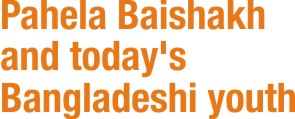Feature

Sabrina Hasan Shoily & Faheem Hasan Shahed
AS far as the present Bangladeshi society is concerned, there is no denying that the word Baishakh represents youthfulness, colour, vigour and festivity. The first day of the Bengali New Year is celebrated with a tremendous passion and zest by the youth all over the country.
The acceptance of today's Boishkahi celebrations has been a gradual one, over a time span of the last fifteen years. Gone are those days when the preparation for Pahela Baishakh was limited to a particular section of people. Students of public universities used to arrange fairs and small-scale cultural shows which were attended by a handful of people. Of course, the gatherings were spontaneous, but people had little options at their hands at that time. Arrive at the Ramna Batomool in the earliest hours of morning, enjoy Chhayanat's live rendering of Tagore, Nazrul and Baul songs, relish some peanuts or jhalmoori followed by water melons, walk in groups toward the Bangla Academy premises through the Suhrawardy Uddyan to buy handicraft items, and return home. This was the average routine of our citizens on the festive day.
But as business and technology flourished, Pahela Baishakh's festivities gained newer momentum and now you can see the extravaganza all over the country. Fashion houses pass some of their busiest days and nights prior to this occasion with more and more artistic collections being launched. Cell phone companies dig out their utmost business-creativities to provide special facilities and offers for mobile-maniacs. Restaurants compete with each other to provide the most exquisite Bangali delicacies for stomach-warriors. And the list goes unending.
So, what has made this day such a happy occasion? Why are all private, even multinational, organisations celebrating this day with such massive enthusiasm? In our judgement, the answer is twofold.
Firstly, Pahela Baishakh has successfully established itself as the only national festival where people irrespective of class-creed-religion are embraced by nature with equal admiration; citizens find a sweet solace to express their hidden patriotic zeal.
And secondly, youngsters of Bangladesh have found this occasion as the greatest chance for enjoying to the fullest forgetting the mechanized, chaotic, competitive life they live. They have hardly any place to go, any ideals to follow, any positive issues to deal with. Who doesn't know how our corrupt politicians and distorted ideologies have vandalized their minds and massacred their dreams? Pahela Baishakh makes them realise that their dreams are not yet dead; this country is still destined for some goodness.
The start of Bangla year with Baishakh has its roots in the days of Mughal Emperor Akbar during 1556-1609. According to one of several opinions about the origin of Bengali year, this was the time when peasants used to pay their taxes to the emperor.
When Bengal came under the Mughal rule in 1576, Akbar decided to switch from the Hijri year and termed this season 'Phawsali' (crop). Thus, Pahela Baishakh marked the start of the crop season.
The present form of the Pahela Baishakh celebrations has some political significance and was introduced in 1965 when Chhayanat organised its celebration programmes in protest against the suppression of Bangali culture by the then Pakistan government. In fact, Pahela Baishakh became an icon of Bangali nationalism during those days of tyranny. The movement led by the uprising middle class through the spirit of Pahela Baishakh eventually turned out to be a comprehensive nationalistic movement which resulted in the emancipation of our motherland in 1971.
The post-1971 era witnessed this festival becoming a symbol of the country's nationalist movement as well as an integral part of the people's cultural heritage.
The youth today are enjoying Baishakh with a lot of enthusiasm, and that is indeed a positive sign for our culture. But we have to keep in mind one thing that in the process of enjoyment, they should neither engage themselves in unruly acts, nor waste money in an unacceptable manner.
For instance, the obnoxious act of eve-teasing in Baishakhi fairs and concerts has fearfully increased. All in the name of merriment! Why don't these boys remember that they have mothers and sisters in their homes? So many cases of harassments done by crooks come on newspaper pages every year that it puts us into shame as a nation. Bangalis, by and large, known for their sophistication and tenderness should not tolerate such disgrace particularly on this soulful day.
| 